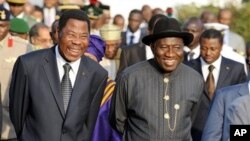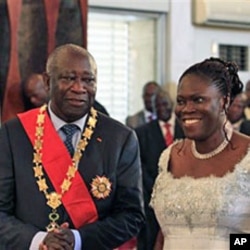A special adviser to embattled Ivorian President Laurent Gbagbo told VOA it will be a mistake for leaders of the Economic Community of West African States (ECOWAS) to use “legitimate force” to remove Mr. Gbagbo from power.
Ambassador Yao Gnamien said the political crisis in Ivory Coast is an internal problem that, in his words, requires an African solution.
“I think that we need to remain African. It is an African crisis (and) we have to solve this crisis with African means. This is why we think that those African heads of state, they have to come to Cote d’Ivoire to listen to the different parties and then to find the solution,” said Ambassador Gnamien.
“We don’t want the military solution. It will be useless for the West African region.”
A delegation of West African leaders is scheduled to meet Mr. Gbagbo Tuesday to tell the Ivorian leader to step down and hand over power to former Prime Minister Alassane Ouattara, or face military force to remove him from power.
Meeting Friday in Nigeria, West African leaders threatened to use force against Mr. Gbagbo unless he accepts the 28th November presidential election results and gives up power.
They said they will send a delegation to Mr. Gbagbo in hopes of convincing him to step down peacefully. However, they warned that, if Mr. Gbagbo refuses to do so, neighboring countries will have “no alternative,” but to take other measures, including the use of force, to enforce the election results.
The African Union, United Nations, and many countries have recognized Mr. Ouattara as the winner of last month’s election. However, Mr. Gbagbo has rejected all attempts to make him leave office.
Ambassador Gnamien said former colonial power France is behind the international community’s stance to remove Mr. Gbagbo from power and warned that “military force” will not be the solution to resolving the crisis.
“It (force) is against the U.N. Charter, Article Two, paragraph four, they said that no nation must use (a) threat (of), or use force in international relations. So, we don’t need these kinds of threats,” said Ambassador Gnamien.
“An electoral controversy is an internal affair (and) we have seen those cases so many times in West Africa. It happened in Togo; it happened in Burkina Faso; it happened in Benin and in Nigeria. We have never used force against any single nation within West Africa after a controversy borne after an election.”





